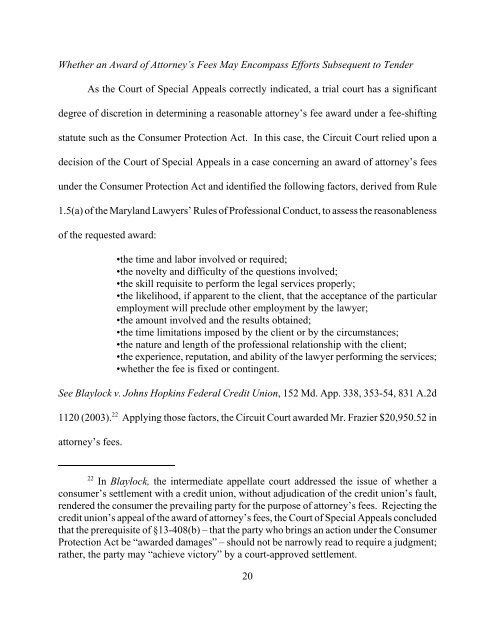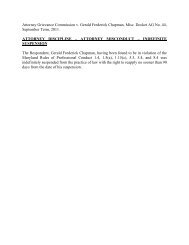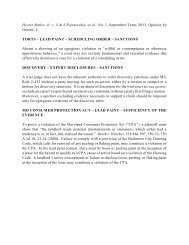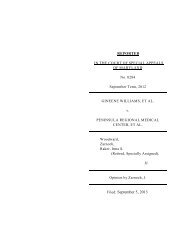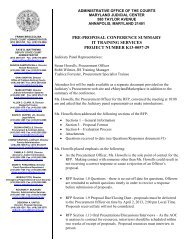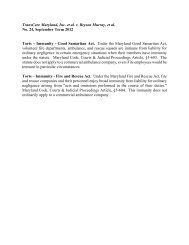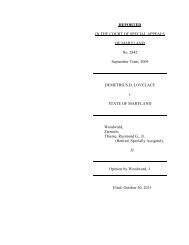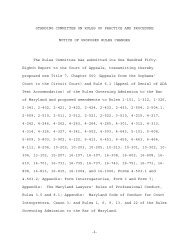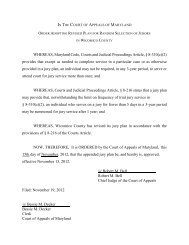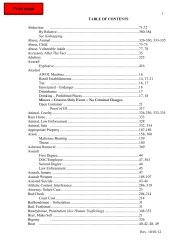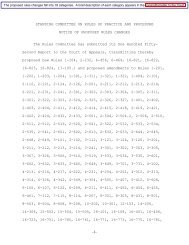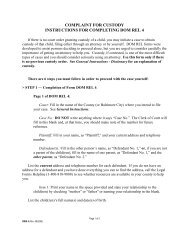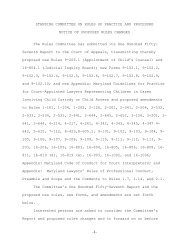Anthony M. Frazier v. Castle Ford, Ltd., f/k/a ... - Maryland Courts
Anthony M. Frazier v. Castle Ford, Ltd., f/k/a ... - Maryland Courts
Anthony M. Frazier v. Castle Ford, Ltd., f/k/a ... - Maryland Courts
Create successful ePaper yourself
Turn your PDF publications into a flip-book with our unique Google optimized e-Paper software.
Whether an Award of Attorney’s Fees May Encompass Efforts Subsequent to Tender<br />
As the Court of Special Appeals correctly indicated, a trial court has a significant<br />
degree of discretion in determining a reasonable attorney’s fee award under a fee-shifting<br />
statute such as the Consumer Protection Act. In this case, the Circuit Court relied upon a<br />
decision of the Court of Special Appeals in a case concerning an award of attorney’s fees<br />
under the Consumer Protection Act and identified the following factors, derived from Rule<br />
1.5(a) of the <strong>Maryland</strong> Lawyers’ Rules of Professional Conduct, to assess the reasonableness<br />
of the requested award:<br />
•the time and labor involved or required;<br />
•the novelty and difficulty of the questions involved;<br />
•the skill requisite to perform the legal services properly;<br />
•the likelihood, if apparent to the client, that the acceptance of the particular<br />
employment will preclude other employment by the lawyer;<br />
•the amount involved and the results obtained;<br />
•the time limitations imposed by the client or by the circumstances;<br />
•the nature and length of the professional relationship with the client;<br />
•the experience, reputation, and ability of the lawyer performing the services;<br />
•whether the fee is fixed or contingent.<br />
See Blaylock v. Johns Hopkins Federal Credit Union, 152 Md. App. 338, 353-54, 831 A.2d<br />
1120 (2003). 22 Applying those factors, the Circuit Court awarded Mr. <strong>Frazier</strong> $20,950.52 in<br />
attorney’s fees.<br />
22 In Blaylock, the intermediate appellate court addressed the issue of whether a<br />
consumer’s settlement with a credit union, without adjudication of the credit union’s fault,<br />
rendered the consumer the prevailing party for the purpose of attorney’s fees. Rejecting the<br />
credit union’s appeal of the award of attorney’s fees, the Court of Special Appeals concluded<br />
that the prerequisite of §13-408(b) – that the party who brings an action under the Consumer<br />
Protection Act be “awarded damages” – should not be narrowly read to require a judgment;<br />
rather, the party may “achieve victory” by a court-approved settlement.<br />
20


